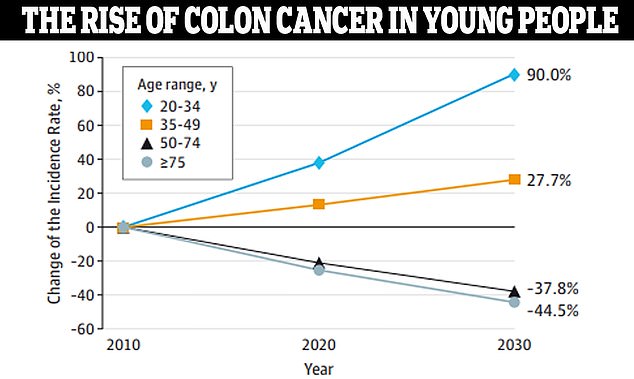How your Listerine mouthwash could be putting you at risk of COLON CANCER, according to lawsuit
Listerine users are suing the mouthwash manufacturer Johnson and Johnson, claiming it puts them at risk of cancer.
A previous study found that the company’s Cool Mint flavored mouthwash increases the number of oral bacteria linked to throat and colon cancer.
Now a class action lawsuit has been filed in California accusing J&J of failing to disclose its alleged risks to customers.
The $5 mouthwash tells consumers to use it for 30 seconds twice a day to kill 99.9 percent of all bacteria in their mouth.
But research suggests that daily use causes levels of two types of bacteria – Fusobacterium nucleatum and Streptococcus anginosus – to rise.
These have been linked to cancer in the esophagus – the tube that connects the throat and stomach – and in the colon.
Researchers also saw a decrease in a group of bacteria called Actinobacteria, which may protect against cancer by helping to reduce inflammation.
Dr. Karen Saghiyan, a colon cancer researcher at Cedars Sinai Medical Center in Los Angeles, drew attention to the lawsuit in an online post that has racked up more than 800,000 views.
A new scientific study has found that daily use of Listerine Cool Mint mouthwash may increase the risk of developing esophageal and colorectal cancer (stock image)
She described the studies as ‘extremely interesting’, but also said it was worrying that Listerine could cause a surge in Fusobacterium species.
The lawsuit was filed by Paige Vasseur, who is seeking damages and accusing Listerine of misleading marketing.
She purchased the mouthwash regularly from 2019 through February 2024, but says she would not have done so if she had been aware of the risks.
Ms Vasseur believes the brand should put a warning about cancer on its bottles and is seeking damages for the costs of purchasing the product.
She calls on others to join the lawsuit.
Cancer rates are increasing among younger age groups, including those of the colon and throat.
Diagnoses of bowel cancer in people under 50, which is classified as early-onset cancer, are expected to increase by 90 percent between 2010 and 2030 in people aged 20 to 34.
Doctors are scrambling to find the cause of the rise in colon cancer, blaming everything from obesity to food additives and disruptions to the gut microbiome. The increase in the number of throat cancer cases has been linked to HPV infection, or infection with a sexually transmitted disease.
Johnson and Johnson, maker of Listerine mouthwash, has yet to respond to the class action lawsuit.
The 35-page class action was filed in early September in California’s United States District Court for the Central District of California.

Scientists at the Institute of Tropical Medicine in Antwerp, Belgium, found that two types of bacteria became more common after three months of daily mouthwash use (stock image)

Data from JAMA Surgery shows that colon cancer is expected to increase by 90 percent in people ages 20 to 34 by 2030
J&J has previously said there is still “no evidence” the product causes cancer.
However, a study by researchers in Belgium, who examined the impact of mouthwash use on 59 gay men, found that there may be a link. They initially investigated how this affected STD risk.
The participants used the Listerine mouthwash for three months, and then a placebo mouthwash for the next three months.
In another study from June this year, researchers said they may be one step closer to unraveling the mystery of what is causing the rising number of colon cancers in young people.
They said that eating too much sugar and not enough fiber causes the intestines to be colonized by a bacteria that “accelerates the aging of cells.” These were Fusobacteria.
In another paper from March this year, they found that half of all colon cancer tumors contain Fusobacterium – suggesting a link.
Dr. Saghiyan said on TikTok, “Earlier this year I read about… Fusobacterium species in the oral cavity linked to the increase in tumors in individuals with colorectal cancer.
“I thought it was extremely interesting because the fusobacterium is actually an oral bacterium, and why on earth would it be in someone’s colon?”
